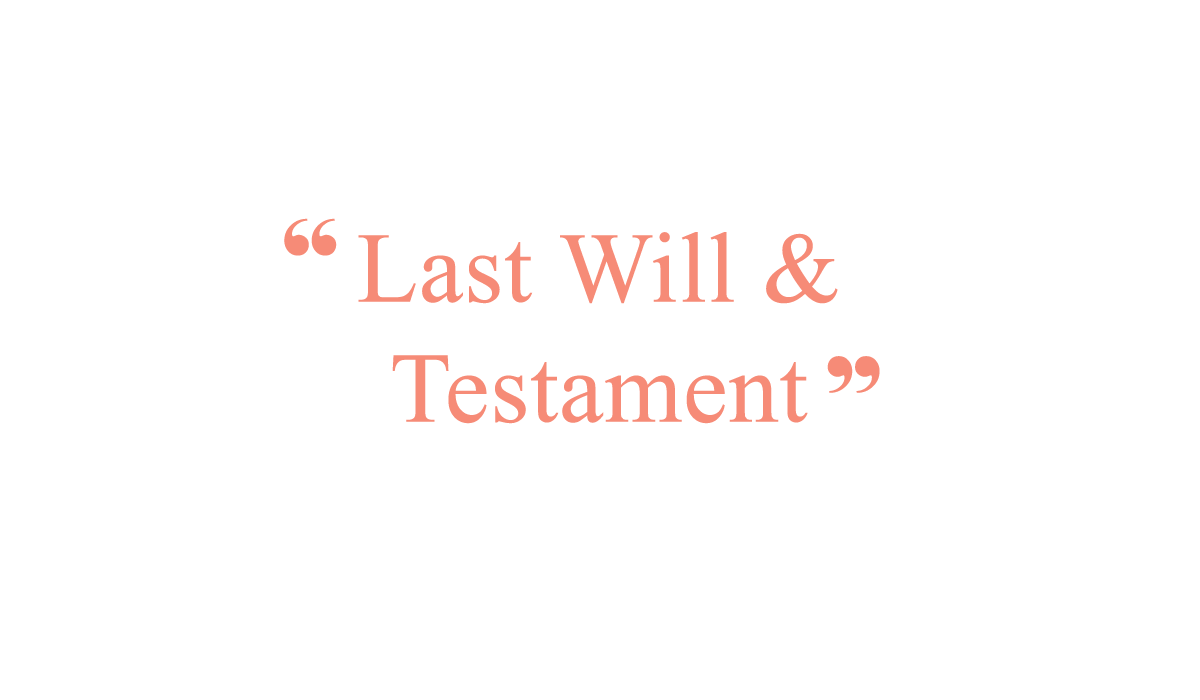
Estate Planning
Contrary to popular belief, estate planning is about more than distributing your physical assets in the future, it also includes medical and health-care contingency plans that can happen at any time in the event you become ill or incapacitated.
Yes, it may feel daunting. But being organized, planning, and having things in order allows for more freedom and better choices for the years to come. It allows you to live with confidence and intention in the present, safeguarding your life and providing you with peace of mind.
We work closely with clients and support them throughout the process, we understand the challenges and the value of planning and are here to help you realize your priorities and options to make well-informed decisions that enable us to craft a plan that communicates your unique wishes clearly, meets your specific needs and protects your assets to create a legacy to leave to those you love.
ESTATE Planning basics
Your Last Will & Testament is the legal instrument that designates the distribution of your assets upon your demise. In the absence of a Will, your assets and guardianship of your dependents may be left to the courts or the State. Assets might be distributed pursuant to the jurisdiction where you last resided or where the assets are situated. A court’s ruling or the plan established by State statute may not always correspond to your wishes. A valid Will is important as it clearly and affirmatively declares your wishes and intentions.
Advanced Directives are legal instruments allowing you to appoint someone to speak or act for you if you are unable to do so or communicate at any time. Upon signing these you designate an agent or agents to act on your behalf in legal, financial, or healthcare matters. These documents can be crucial and are drafted to each client’s specific circumstances.
Whereby you appoint an agent and provide authority for your designated agent to legally act on your behalf in legal and financial matters and decisions if you are incapable of doing so.
Whereby you appoint an agent and provide authority for your designated agent to legally act on your behalf in healthcare matters and decisions if you are incapable of doing so.
Whereby you provide a written statement with specific instructions detailing your desires with regard to end of life decisions in the event that you are no longer able to.

Trusts can be an additional part of the Estate Planning process and added method of asset transfer, allowing for more control of how your assets are allocated while you’re alive, enabling you to protect your legacy and provide more privacy. A trust is an arrangement whereby you (the trustor/grantor or testator) give another party (your trustee) authority to hold and manage your assets on your behalf for the benefit of your beneficiaries. Trusts can be created and arranged in a variety of ways and perform a range of functions in accordance with your preferences and desired outcome.
A Living Revocable Trust is made by you (the trustor/grantor) during the course of your life and as the trustor/grantor you are able to change, terminate or otherwise alter while you are alive. This type of trust is often set up to transfer assets to avoid probate, protect your privacy and that of your beneficiaries, as well as minimize estate taxes. It allows for you to benefit from the trust, maintaining ownership of your assets in the trust while you are alive, but passes the assets on, outside of probate court, to your beneficiaries, via your trustee, when you pass.
An Irrevocable Trust is made by you (the trustor/grantor) however the terms cannot be modified, amended. or terminated during your lifetime without the permission of your named beneficiaries. As your assets are transferred completely out of your name and into your beneficiary’s name/s, they cannot be moved back into your possession, thus often making it more tax efficient, sheltering assets from estate taxes, while also offering protection against creditors.
A Testamentary Trust is used to oversee your assets once you pass, it lays within your Last Will and Testament and is a trust which only comes into being once you, the testator, passes and it goes through probate, distinguishing it from other trusts that are created during your lifetime. It helps protect against the dissipation of your assets due to taxation and where minor, disabled, and spendthrift beneficiaries are involved. And allows you to have a degree of control after you pass and ensure management of your assets via the appointed trustee, who directs the trust at their discretion until a set time when the trust realizes its specified objectives.
Probate is the legal process whereby your will is ‘proved’ in a court of law and accepted as a valid public document, your true last testament. Once approved and granted, it generally involves settling your estate, including paying any debts you owe and distributing and transferring assets to your beneficiaries. The presence of your Will determines how and to whom your estate will be transferred during probate. In the absence of a Will, the laws in your state of residence will decide how your estate is distributed and to who. Probate varies from location to location, however, it is a public record thus decreasing the privacy of a probate hearing.
Probate can be a difficult process after a loved one passes and especially challenging when there is no will in place and probate disputes can easily add stress to an already sensitive topic. During these emotional and often complex times, we are here to help you successfully navigate the probate process as expeditiously as possible, we utilize mediation skills to minimize disputes and hostilities, but are ready to contest ambiguous or incorrectly executed wills, defend against disgruntled beneficiaries and stand firm in advocating for your rights and the wishes of your loved ones.






